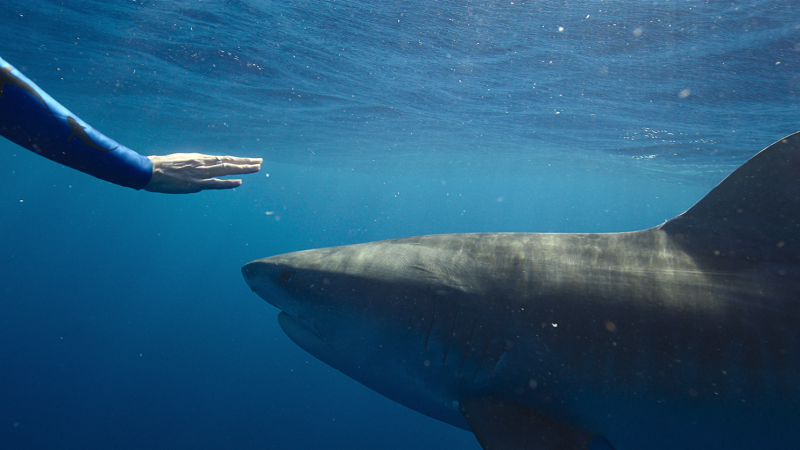Netflix is diving into the depths of our cultural fascination with sharks through its latest documentary, Shark Whisperer. The film spotlights Ocean Ramsey, a free-diving conservationist whose life mission revolves around changing the narrative surrounding these often-feared marine predators. According to Netflix, Ramsey’s “fascination and kinship with one of the ocean’s most feared predators” drives the film’s narrative.
Ramsey, who believes sharks are “gravely misunderstood and unfairly maligned,” uses the documentary to highlight the critical role sharks play in maintaining a balanced marine ecosystem. “Over 100 million sharks are killed each year, imperiling the survival of a species that is integral to a balanced marine ecosystem, and critical to a healthy Earth,” states a feature on Netflix’s Tudum site.
The Controversy Surrounding Ocean Ramsey
While Shark Whisperer aims to reshape perceptions, it has not been without controversy. Ramsey’s approach, which involves close interactions with sharks, has drawn criticism from both the scientific community and the public. Critics argue that her methods, which often involve direct contact with the animals, could endanger both herself and the sharks.
In the documentary, Ramsey defends her approach, stating, “I’m not a crazy person. I’m hyper aware of what they’re capable of.” Her partner and videographer, Juan Oliphant, supports her mission to advocate for shark safety and improve their image.
Expert Opinions and Public Reaction
According to marine biologists, while Ramsey’s passion is commendable, her methods may inadvertently promote risky behavior. Dr. Jane Stevens, a marine biologist at the University of Miami, explains, “While raising awareness is crucial, interactions that involve touching or riding sharks can lead to misunderstandings about the nature of these wild animals.”
Meanwhile, Ramsey’s advocacy through social media, where she has amassed over 2 million followers on Instagram, continues to spark debate. Her platform is a double-edged sword, offering both a stage for education and a flashpoint for criticism.
Sharks in Popular Culture
The release of Shark Whisperer taps into a long-standing cultural obsession with sharks, fueled by films like Jaws and annual events like Shark Week. These portrayals often emphasize the dangers sharks pose, overshadowing their ecological importance.
Historically, sharks have been depicted as “monsters,” a narrative that Ramsey and others in the conservation community are eager to change. By showcasing their importance to marine ecosystems, advocates hope to shift public perception from fear to respect.
Implications for Conservation Efforts
The documentary’s release comes at a critical time for global shark populations. With millions of sharks killed annually, largely due to overfishing and the fin trade, conservationists argue that changing public perception is key to enacting protective measures.
“Sharks are not the villains they’re made out to be. They are essential to the health of our oceans,” says Dr. Stevens.
By drawing attention to these issues, Shark Whisperer could bolster efforts to implement stricter regulations and increase funding for marine conservation initiatives.
Looking Ahead: The Future of Shark Conservation
As Shark Whisperer streams on Netflix, its impact on public opinion and policy remains to be seen. The documentary could serve as a catalyst for change, encouraging viewers to engage with shark conservation efforts more actively.
For Ramsey, the film represents a personal and professional milestone. “I hope that people will see sharks for what they truly are: crucial players in our planet’s health,” she says.
With an increasing number of documentaries and campaigns focused on marine life, the conversation around sharks continues to evolve. Whether Shark Whisperer will succeed in altering entrenched perceptions remains an open question, but it undeniably adds a compelling voice to the ongoing dialogue about the future of our oceans.
About The Author
 Secur-Serv’s Strategic Acquisition of Arrowhead Technologies Boosts IT Services in Southwest
Secur-Serv’s Strategic Acquisition of Arrowhead Technologies Boosts IT Services in Southwest Televangelist Jimmy Swaggart Dies at 90 After Scandal-Ridden Career
Televangelist Jimmy Swaggart Dies at 90 After Scandal-Ridden Career Lululemon Files Lawsuit Against Costco Over Trademark Infringement
Lululemon Files Lawsuit Against Costco Over Trademark Infringement Top Summer Stocks: Diverse Sectors Shine with Hilton on the Rise
Top Summer Stocks: Diverse Sectors Shine with Hilton on the Rise CareConnect’s New Platform Revolutionizes Caregiver Recruitment and Engagement
CareConnect’s New Platform Revolutionizes Caregiver Recruitment and Engagement